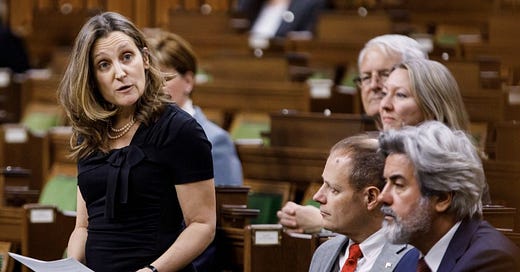Which Energy Subsidies Does Chrystia Freeland Want?
Canada's Finance Minister decries the “curse of oil”, but says she’ll support “economically feasible” fossil fuel projects. Has the pivot got your head spinning yet?
It’s been getting so much attention lately that headline writers are calling it the “Freeland Doctrine”.
And the recent musings of Canada’s Deputy Prime Minister and Finance Minister, Chrystia Freeland, contain mixed messages and important implications for the next round of decisions on whether the country pushes for faster, deeper carbon cuts or rolls out another round of fossil fuel subsidies.
That choice, in turn, will echo back into another spectacle taking up political oxygen in Ottawa this week—the federal inquiry into the insurrectionist convoy that occupied the capital city of a G7 country and held our downtown neighbours hostage for three weeks last winter.
The ‘Curse of Oil’
It began with a talk at the high-powered Brookings Institution in Washington, DC October 11, where Freeland called for western democracies to connect their economies more closely, while cooperating with the world’s dictators on issues—like climate change—that they can only solve together.
She laid out an approach to “friendshoring”, in which countries “make a conscious effort to build our supply chains through each other’s economies.” The speech cast economic cooperation among like-minded governments as an extension of the military cooperation that followed Russia’s invasion of Ukraine.
One of her examples was a US$7,500 electric vehicle tax credit in the Biden administration’s Inflation Reduction Act (IRA) that is limited to components produced in any country with which the U.S. has a trade agreement. (That requirement was originally a Buy American clause, and Canadian trade officials sounded a “collective cheer” in August after persuading the White House to broaden its scope.)
“Critically, friendshoring must be green,” Freeland said in her Brookings speech. “The curse of oil is real, and so is the dependence of many of the world’s democracies on the world’s petro-tyrants.”
‘Economically Viable’ LNG
But less than a week later, the veteran Liberal politician often called the government’s “Minister of Everything” was back in the news during the annual meetings of the International Monetary Fund and the World Bank.
Liquefied natural gas “is an important transition fuel,” and “we will always be looking at economically viable LNG projects,” she declared, in what was interpreted as a counterweight to Cabinet climate hawks like Environment and Climate Minister Steven Guilbeault and Natural Resources Minister Jonathan Wilkinson.
Freeland said Canada is leading, not lagging the global shift to green energy, but will still have to be the “best and fastest” at that transition after the Biden administration poured $369 billion into the IRA. Earlier in the week, Prime Minister Justin Trudeau said Ottawa was crafting new incentives for carbon capture and storage and clean energy projects to “even the playing field” between the U.S. and Canada.
“It’s urgent,” said Michael Gullo, vice president for policy at the Business Council of Canada. “There’s a race going on to attract billions of dollars of investment.”
The CCS Trap
The new infusion of federal cash is expected to show up in Freeland’s next fiscal update, due in December. But if Freeland’s plan and the fossil lobby’s dream is to free up another round of lavish carbon capture subsidies—something Guilbeault had already ruled out in an era of obscene, record-breaking oil and gas profits—they’ll have some uncomfortable realities to navigate.
• With the Global CCS Institute crowing about a surge of new projects in its latest annual survey, all of those new carbon capture plants—even if they’re all built, and even if they work as planned—will still remove less than 1% of the greenhouse gas emissions that humanity produces each year.
• Whether they’ll be built and whether they’ll work is more than just an idle cheap shot. A sweeping industry assessment last month warned that 10 of the 13 “flagship, large-scale” CCS projects, accounting for about 55% of the world’s current carbon capture capacity, either underperformed, failed outright, or had to be mothballed.
• Even if Canadian fosslls can make CCS work—after untold billions in subsidies—they’ll only capture about 20% of the carbon pollution in every barrel of oil the industry extracts. The rest is exported to another country, only to enter the atmosphere after it reaches its destination and is used as directed.
• If it’s about competing with the U.S. for investment dollars, the lavish, C$7.1-billion CCS subsidy in Freeland’s 2022 budget already does that and more. In testimony last week to the House Environment and Sustainable Development Committee, Iron & Earth Executive Director Luisa Da Silva said only 2.3% of the energy spending in the U.S. IRA is earmarked for CCS, compared to 48% for home energy efficiency and community resilience. Freeland’s budget handed CCS nearly four times as much funding as clean electricity initiatives.
That’s after the $5.8 billion Canada has handed over in CCS subsidies since 2000 delivered projects that only capture 0.05% of the country’s emissions, Da Silva told MPs.
No wonder the independent, swashbuckling free enterprisers in Canada’s oilpatch want taxpayers to fund their grand experiment, rather than putting their shareholders at risk.
Down and Out in Downtown Ottawa
It’ll be important for Freeland to craft a fall economic statement that embodies her worries about the “curse of oil” and the need for a fast transition. It’ll make all the difference for climate action.
But the convoy occupation that paralysed downtown Ottawa and the border crossings at Coutts, Alberta and Windsor, Ontario was also a stunning illustration of what happens when scarce taxpayer dollars are spent on fossil lobbyists’ technological pipe dreams, rather than climate solutions that create jobs and build communities.
The defining images and traumatic memories of the occupation begin with the Nazi, Confederate, and Three Percenter flags flying in downtown Ottawa and the insurrectionist manifesto that called for the overthrow of a duly-elected government. But the reality on the ground—the parents who brought their children, their barbecues, and their bouncy castles to the foot of Parliament Hill—was a lot more varied.
Many of them said the convoy was the most important thing they had done in their lives. That they were standing up for their families and their communities. That they were doing this because they’d never been able to get ahead or make a difference. That they thought the system was rigged against them.
Vaccine mandates were the match that lit the fuse, making it painfully hard for anyone who accepts health science and public health practice to connect with the grassroots of the convoy. But the deep feelings of hopelessness and dispossession that drove the occupation? Anyone who works on climate change, energy transition, inequality, income insecurity, housing, or a host of other, intersecting issues and crises could have spoken the same words (excluding the profanities and threats directed at Trudeau and his ministers).
That means Canada’s Minister of Everything has an even more important and profound decision ahead of her. She can make a courageous stand against the “curse of oil”. Or she can double down on carbon capture subsidies, maybe support a new LNG project or gas pipeline. Her choice will make all the difference for years and generations to come, in ways that extend beyond the energy sector and will either prop up or engulf the entire society.
Mitchell Beer traces his background in renewable energy and energy efficiency back to 1977, in climate change to 1997. Now he scans 1,200 news headlines a week to pull together The Energy Mix and The Energy Mix Weekender.
You can also bookmark our website for the latest news throughout the week.
Tweet of the Week


EXCLUSIVE: Rumoured Keystone Pipeline Sale Could Increase Spill Risk
Canada Will Support ‘Economically Feasible’ LNG, Freeland Says
Oilsands Alliance Demands Federal Backing for $24.1B CCS Project
Ottawa Overspends on CCS, Neglects Worker Skills: Iron & Earth
Nearly a Million Canadian Households Face Energy Poverty
Don’t Let Hydrogen Hype Become a Bubble, Liebreich Warns
Nearly a Million Canadian Households Face Energy Poverty
Global CO2 Emissions ‘Defy Expectations’ Due to Renewables, EV’s
Cities Must Slash Emissions 50% by 2030 for 1.5°C Pathway
Canadian Forestry Emits as Much as Oilsands, Analysis Says
New Jersey Sues Big Oil for Deceiving on Climate Change
Wildfire Causes ‘Irreparable’ Damage to Easter Island Statues
Next Pandemic May Come from Melting Glaciers (The Guardian)
Young Workers Steer Clear of Oil Industry Jobs (Grist)
UK University Bans Fossil Fuel Recruiters (Guardian)
South Africa Earmarks $8.5B for Just Transition (Climate Home News), Needs 5 Times More from International Donors (Reuters)
3rd Big Storm in 5 Years Puts Magdalen Islands on Climate Front Line (Canadian Broadcasting Corporation)
Dollars Needed for Net-Zero Transition Are ‘Sitting Idle’ (Responsible Investor)
Future Financing May Depend on Sustainability Strategy, HSBC Warns Companies (IEEFA)
Lithium-Ion Battery Recycler Nabs Investment from GM (Mining.Com)
Quebec Community Splits Over Graphite Mine for EV Material (Globe and Mail)
Germany Receives First, Symbolic ‘Green’ Hydrogen Shipment from UAE (The Associated Press)
Nova Scotia Accused of Greenwashing Green Hydrogen (Halifax Examiner)
Fact Checker ‘Debunks’ B.C. Gas Industry’s Climate Claims (The Tyee)
Gas Appliances Leak Benzene, Other Toxins, Study Finds (New York Times)
U.S. Carbon Capture Lobby 'Weakened Guardrails' on CCS Subsidy (Energy and Policy Institute)
U.S. Plastics Lobby Pushes Storyline of 'Recyclable' Yogurt Cup (Grist)
Chaozhou, China Plans Massive 43.3-GW Offshore Wind Megaproject (IEEFA)
Southern Alberta First Nation Hopes Sweetgrass Can Sequester Carbon (The Narwhal)
Video of the Week
Who actually controls gas prices? 20 years of oil history in 23 minutes from Climate Town.
Climate Solutions = Climate Action
We all want to be part of the solution to climate change. Here’s where you can start.








Good article! I’d like to recommend a book: Bypassing Dystopia, by Joyce Nelson. It’s about trade agreements. For $20 you can get a copy from www.watershed sentinel.ca (Comox, B.C.)